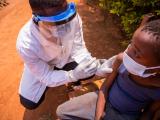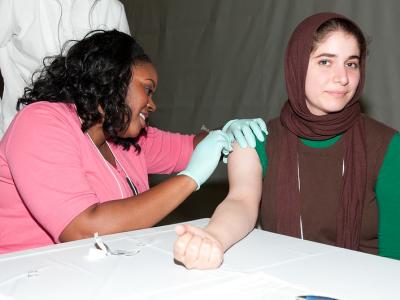A study on how Omicron subvariants transmit in Danish households found that the BA.2 subvariant is substantially more transmissible than the original variant, researchers reported yesterday in preprint findings.
BA.2 is now dominant in Denmark, with levels rising in other countries, raising questions about how fast current surges will decline. In South Africa, which first reported the original Omicron variant, BA.2 levels are increasing, but against the backdrop of decreasing infections, Tulio de Oliveira, PhD, who directs South Africa's Centre for Epidemic Response and Innovation, said yesterday.
The study has not yet been subjected to a peer-review process.
Less transmission from breakthrough cases
The Danish group of scientists examined secondary attack rates in households that had a primary case between Dec 20, 2021, and Jan 11, looking at differences in transmission between BA.2, BA.1 (the original Omicron variant), unknown, and Delta variants. Of the households, 2,122 had an initial BA.2 case, and 6,419 had a primary BA.1 case.
They found that the secondary attack rate was substantially higher for BA.2 than BA.1, estimating that the rate was 39% for BA.2 and 29% for BA.1.
When the team looked at susceptibility differences, they found that BA.2 was associated with increased susceptibility in unvaccinated people, fully vaccinated people, and those who had received boosters compared with BA.1. They also found that unvaccinated primary cases involving BA.2 were more likely to transmit the virus, compared to those who had the original strain. However, they didn't find increased transmissibility from vaccinated or boosted people who had BA.2 breakthrough infections.
Frederik Plesner Lyngse, PhD, the study's first author who is with the University of Copenhagen and Denmark's Statens Serum Institute, said on Twitter that it's important to sort out the difference between the two Omicron variants, because BA.2 is very different than BA.1, differing by about 40 mutations. He noted that BA.2 increased rapidly in Denmark, rising from 0% of sequences samples on Dec 6 to 47% of sequenced samples on Jan 11.
The European Centre for Disease Prevention and Control (ECDC) said in its latest update that BA.2 is now dominant in Denmark.
Commenting on the study, Eric Topol, MD, founder and director of the Scripps Research Translational Institute, said on Twitter than the BA.2 variant findings suggest 3-dose vaccination protects well against symptomatic infection, which goes against any increased immune evasion. He also added that BA.2's increased transmissibility will prolong the Omicron wave in many places.
More global headlines
- Russia reported a new daily record high of 124,070 cases today, as officials began rolling out a reduced-dose version of the Sputnik COVID-19 vaccine for adolescents ages 12 to 17, according to the Associated Press.
- Ahead of the Winter Olympic Games opening ceremony on Feb 4, China has reported 119 COVID-19 positives in athletes or staff over the past 4 days, according to Reuters. China, one of the few countries with a "zero COVID" policy, is using a closed-loop system for keeping Olympic participants away from the general public.
- Austrian officials announced over the weekend that the government will begin easing COVID-19 restrictions this week, according to Reuters. Though cases numbers are still high, hospitalization levels are lower.
- Following the exit of musicians and subscribers due to COVID-19 misinformation, Sweden-based Spotify said yesterday that it would be more transparent about its existing platform rules and will add content advisories to podcast episodes that discuss COVID-19, which would direct users to up-to-date scientific information from trusted sources.
- The global totals today climbed to 376,313,301 cases, with 5,668,707 deaths, according to the Johns Hopkins online dashboard.




















